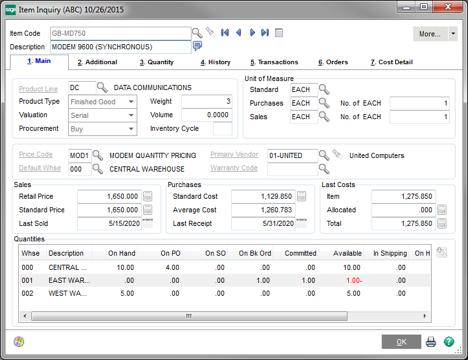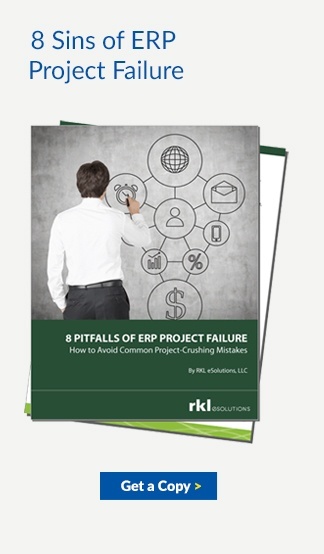We combine our expertise with accounting skills and systems experience, tailoring our services and solutions to satisfy your technology needs.
Contact UsQuick Contact
Have a question? We have answers. Ask us anything.Subscribe Here!
Sage 100 vs QuickBooks Enterprise
 The number of ERP software options out there is overwhelming. As a result, the task of choosing the right ERP software for your company can be confusing.
The number of ERP software options out there is overwhelming. As a result, the task of choosing the right ERP software for your company can be confusing.
ERP systems are not “one size fits all.” What works perfectly for one company may not be a fit for you, your users, your objectives, or your business processes.
So to lay it out for you, here’s how Sage 100 vs QuickBooks Enterprise – two popular ERP solutions on the market today – stack up against one another.
Company Viability
Note: Company viability is important because it represents how publishers like Sage and QuickBooks manage their expenses, the availability and allocation of funding to R&D, and likelihood that the publisher will continue investments that enhance the customer experience.
Sage (The Sage Group, plc) is a publicly-held company currently traded on the FTSE 100 and has posted steady, predictable growth year-after-year since 1989. Sage is the 3rd largest ERP software provider worldwide in terms of revenue ($2.2 billion) and #1 with a base of more than 6 million customers worldwide. Visit the Sage Investors page for more information about financial and stock performance.
Founded in 1983 with Quicken, Intuit is headquartered in Mountain View, CA. Intuit’s flagship products are QuickBooks, TurboTax, Quicken and Mint. Intuit QuickBooks is stated to have approximately 29 million business installs in the US however Intuit does not disclose their install base by product. It’s estimated that Intuit has less than 6 million users worldwide with Intuit’s overall annual revenue exceeds $4 billion.
Breadth of Features Out of the Box
Note: Each ERP product delivers core functionality for accounting operations but only one includes industry specialization that separates it from the competition.
Sage 100 was designed as a horizontal solution with functionality that meets the basic needs across several industries. Delivering out-of-box functionality for Financials, Distribution and Manufacturing capabilities. Like many midmarket solutions, Sage 100 relies on its channel for add-ons and industry expertise through Sage Endorsed Solutions and business partners like RKL eSolutions.
QuickBooks offers a basic software to manage accounting payroll, and minimal inventory. For more functionality QuickBooks has a variety of solution including QuickBooks Self-Employed, QuickBooks Premier, and QuickBooks Enterprise. For this discussion, QuickBooks Enterprise is the comparative product.
QuickBooks Enterprise is comprised of 5 key areas: accounting, payroll, payments, inventory and reporting. It is a simple and easy-to-use accounting solution. The QuickBooks marketplace provides options for users to extend QuickBooks Enterprise with add-ons for critical functions of construction, manufacturing, field services, nonprofit, retail and professional services. QuickBooks can be purchased off the shelf for immediate use; which can be convenient but can also lead to future challenges as your company grows and requires more system functionality.
Inventory and Manufacturing Functionality
Sage 100 out of the box provides native distribution and manufacturing capabilities (Sage 100c) making it a suitable fit for small and medium sized businesses ranging from 5 to 50 users. Sage 100 allows for multi warehouses within Inventory. Sage 100c is a version of Sage 100 with manufacturing modules for those companies needing discrete manufacturing and/or light assembly which can include Make to Order (MTO) and/or Engineer to Order (ETO).
QuickBooks targets small businesses with very basic accounting requirements focused on the organizations’ finance needs primarily. Inventory tends to max out at 1 million items (inventory, non-inventory, service). Inventory tracking works well for companies who just want to use the average cost method, anything else you should upgrade to Advanced Inventory. Back order and partial shipments can also be difficult to track in QuickBooks, making industry add-on solutions such as Fishbowl your best option.

Sample of multiple warehouse scenario in Sage 100
Performance and Scalability
Sage 100 was built to be database driven and has been based on a SQL server backend since 2011. Sage 100 has the ability to support file sizes of up to 2GB. With concurrent licensing Sage 100 can support up to 100 users. When companies outgrow the capabilities of Sage 100, Sage also offers a migration path, conversion tools and price incentives to select another Sage solution such as Sage X3.
QuickBooks Enterprise can have up to 30 simultaneous users. QuickBooks is not Windows specific and can be installed on Macintosh computers. QuickBooks performance starts to decrease as the company file size increases. The general guideline on file limits (posted in the Intuit Community) is no more than 1GB or more than seven years for transaction history. Security in QuickBooks can be compromised with users who have multiple logins.
Financial Management and Reporting
Sage 100 offers real time reporting tools for financial management. Sage 100 allows for tracking things like margins over time so you can optimize trends and profitability. Sage 100 also allows for multi departments and multi company consolidations.
While QuickBooks Enterprise has advanced reporting capabilities for accounting, it does not have consolidated reporting across multiple business units. QuickBooks is not GAAP compliant which is not an issue if you only need limited reporting however, completing board of directors statements or annual investor audits can be cumbersome in QuickBooks.
Cost (Monthly Subscription)
Both Sage 100c (premium subscription version) and QuickBooks are competitively priced. With either product, there are a range of variables to consider when calculating your final cost.
Sage 100c supports both on-premise or private hosting deployment through a subscription price-model.
QuickBooks Enterprise subscription pricing begins at $80 per user per month before considering add-on pricing for needed industry specific solutions (ex. Manufacturing, etc).
Sage 100c pricing begins at $78 per user per month before considering a la carte module options and add-ons. A one-time setup fee is additional and calculated per user. Cost is representative of an on-premise deployment and does include monthly private hosting.
Slight Advantage = Sage 100c
Only Sage 100c provides the flexibility of an on-premise or private cloud deployment. The freedom to choose whether you prefer to have the software reside on your own servers or hosted in a private cloud has an impact on its IT resources and the ongoing cost of ownership. To fully understand the pricing options, it is best to compare the two solutions with all the add-on modules you might need.
* Note: cost calculations performed based on information available as of July 2016. Please check with a Sage or QuickBooks authorized partner for a quotation of current pricing and implementation.
Other Helpful Resources
Sage 100c vs. Intacct
Sage 100c vs. Microsoft Dynamics GP
Sage 100 vs. Infor
Sage 100 vs Sage 100c
How to Reduce Costs with Subscription Pricing
Sage 100 System Requirements
Who’s the Winner?
Sage 100 vs Quickbooks Enterprise
 You decide! Contact us for an ERP software consultation or to see a demo and you can decide which product delivers the knock out blow for your company.
You decide! Contact us for an ERP software consultation or to see a demo and you can decide which product delivers the knock out blow for your company.

